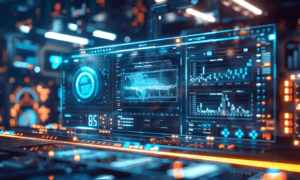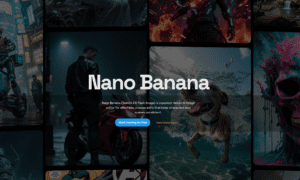In today’s competitive business landscape, recruitment and talent acquisition play a critical role in ensuring an organization’s growth and success. However, traditional recruitment methods often involve tedious processes, including sifting through vast amounts of resumes, conducting initial screening, and managing candidate interactions. Generative AI and AI agents have emerged as transformative solutions in this area, enhancing efficiency, accuracy, and personalization in recruitment. These technologies are not only changing how talent is acquired but also revolutionizing the way HR operations are conducted.
This article will explore the role of Generative AI for recruitment and talent acquisition, the applications of Generative AI in HR operations, and how AI agents are transforming the landscape of human resources. We’ll also look at the benefits, challenges, and future potential of AI in HR.
Introduction to Generative AI in Recruitment and Talent Acquisition
Generative AI, powered by advanced machine learning algorithms, has the ability to create, generate, and optimize human-like outputs based on massive data sets. In recruitment, Generative AI helps automate a variety of tasks traditionally handled by human recruiters, including resume screening, candidate engagement, job description creation, and interview scheduling. AI agents, autonomous systems designed to perform specific tasks, complement generative AI by handling repetitive processes and improving decision-making in HR operations.
With the increasing demand for talent, the speed of recruitment and talent acquisition has become crucial. Generative AI helps meet these demands by processing large volumes of candidate data faster and more efficiently than humans, allowing HR teams to focus on strategic tasks rather than administrative ones.
The Rise of AI in HR and Recruitment
The adoption of AI in HR and recruitment is on the rise, driven by several factors:
- Improved Efficiency: Generative AI tools and AI agents automate time-consuming tasks such as resume screening, candidate sourcing, and interview scheduling.
- Data-Driven Decision Making: AI systems analyze vast amounts of data to help HR professionals make data-driven decisions on candidate selection.
- Enhanced Candidate Experience: Personalized AI-driven interactions ensure a more engaging and responsive recruitment process.
- Cost Savings: By reducing the need for manual intervention, generative AI reduces recruitment costs and improves resource allocation.
- Scalability: AI systems can handle a high volume of recruitment tasks, making them ideal for large-scale hiring processes.
How Generative AI Transforms Recruitment and Talent Acquisition
1. Automated Resume Screening and Candidate Shortlisting
One of the most time-consuming tasks in recruitment is sifting through countless resumes to find the best-fit candidates. Generative AI simplifies this process by automatically reviewing resumes and cover letters, extracting key data such as skills, experience, and education. AI algorithms can then rank candidates based on the job description’s requirements, significantly speeding up the shortlisting process.
For example, a company can input its job description into a generative AI system. The AI will then match keywords from the job description with candidates’ resumes, highlighting the most relevant qualifications. This eliminates the need for manual screening and ensures that the most qualified candidates are identified first.
2. Job Description Generation
Creating compelling and inclusive job descriptions is another area where generative AI proves invaluable. AI can generate customized job descriptions based on a set of inputs, including role requirements, qualifications, and company culture. This not only saves time but also ensures that the descriptions are inclusive, neutral, and free from bias, promoting diversity in the hiring process.
3. AI-Driven Candidate Sourcing
Generative AI can be used to scan online platforms such as LinkedIn, job boards, and social media to source potential candidates. By analyzing millions of profiles and resumes, AI agents can identify candidates who best match the job requirements. These AI-powered tools can even predict which candidates might be interested in the role, creating a more targeted and proactive approach to recruitment.
4. Interview Scheduling and Coordination
Another time-consuming task for HR professionals is scheduling interviews. AI agents can automate this process by interacting with candidates and recruiters to find suitable times for interviews. The AI can also send reminders and updates to ensure that all parties are prepared. This process ensures faster interview scheduling, reducing delays in recruitment.
5. Candidate Engagement and Communication
AI-powered chatbots and virtual assistants can engage with candidates at various stages of the recruitment process. From answering queries about the role to providing updates on application status, these AI agents ensure seamless communication, offering a more personalized experience for candidates. Additionally, generative AI can craft tailored messages to encourage engagement and maintain candidate interest.
6. Interview Assessment and Feedback Generation
Generative AI can also play a pivotal role in assessing candidates during interviews. By analyzing candidate responses, AI systems can generate insights about their qualifications, personality, and potential cultural fit. This analysis can be supplemented by feedback and suggestions for improving the interview process itself, providing valuable insights for HR professionals.
7. Onboarding Assistance
Once a candidate is hired, Generative AI can assist in onboarding by automating the documentation process, guiding new employees through their orientation, and even answering frequently asked questions. This ensures a smooth and efficient onboarding process, enhancing the new hire’s experience and improving overall retention.
Generative AI for HR Operations: Streamlining HR Tasks
1. Payroll and Compensation Management
Generative AI for HR operations can optimize payroll processes by automating compensation calculations, managing deductions, and ensuring compliance with tax regulations. AI-powered systems reduce the risk of human errors and improve efficiency in payroll management, ensuring timely and accurate payments.
2. Employee Performance Management
Generative AI can assist in evaluating employee performance by analyzing data from various sources such as self-assessments, manager reviews, and peer feedback. AI can generate performance reports and offer actionable insights to help HR managers make more informed decisions about promotions, bonuses, or career development plans.
3. Employee Retention and Engagement
AI agents can analyze employee data to detect early signs of disengagement or dissatisfaction. By recognizing patterns such as declining performance, reduced communication, or other indicators, AI systems can flag at-risk employees, enabling HR teams to take proactive steps to improve engagement and retention before problems escalate.
4. Training and Development Programs
AI-powered platforms can analyze employee skill sets and identify areas where training and development are needed. Generative AI can help create personalized learning paths based on employees’ roles, performance, and aspirations. Additionally, AI can recommend relevant courses, workshops, or certifications, promoting continuous learning and professional growth within the organization.
5. Talent Pool Management
Generative AI can help HR departments build and manage talent pools by continuously analyzing internal and external candidate databases. AI agents can track top talent and engage with potential candidates, ensuring that the company has access to a pipeline of qualified professionals when vacancies arise.
6. Diversity and Inclusion Initiatives
Generative AI plays a significant role in promoting diversity and inclusion within HR operations. By using AI to remove bias from recruitment processes (such as resume screening or interview evaluations), companies can ensure that their hiring practices are more equitable and inclusive. Additionally, AI systems can analyze diversity metrics and recommend actions to improve workforce diversity.
Benefits of Generative AI and AI Agents in Recruitment and HR Operations
1. Increased Efficiency
Generative AI and AI agents automate numerous time-consuming tasks such as resume screening, candidate sourcing, and interview scheduling, significantly increasing the speed and efficiency of HR operations. This allows HR teams to focus on strategic initiatives like talent development and employee engagement.
2. Improved Accuracy and Reduced Bias
AI systems can analyze large volumes of data with a high degree of accuracy, reducing human error. Additionally, AI’s ability to remove bias from the recruitment process helps ensure that hiring decisions are based solely on candidate qualifications and not influenced by unconscious bias.
3. Cost Savings
By automating administrative tasks, AI solutions reduce the need for manual labor, lowering operational costs for HR departments. Companies can achieve more with fewer resources, making AI-powered recruitment more cost-effective than traditional methods.
4. Enhanced Candidate Experience
AI agents engage with candidates in real-time, answering questions, providing feedback, and ensuring that candidates have a smooth and personalized experience throughout the recruitment process. This helps improve employer branding and ensures that the best candidates stay engaged.
5. Scalability
AI agents can handle recruitment tasks at scale, making them ideal for organizations experiencing rapid growth or those that need to recruit for large numbers of roles. This scalability is particularly beneficial for companies in industries such as retail, technology, and healthcare.
6. Better Talent Match
Generative AI improves talent matching by analyzing both structured data (like resumes) and unstructured data (such as candidate preferences and behaviors). This ensures that candidates are not only qualified but also a cultural fit for the organization.
Challenges in Implementing Generative AI in Recruitment and HR Operations
1. Data Privacy and Security
One of the biggest concerns with the use of AI in HR is data privacy. Recruitment processes involve sensitive personal information, and ensuring that AI systems comply with privacy regulations like GDPR is critical. Companies must take steps to protect candidate data and ensure that AI systems are secure.
2. Integration with Existing Systems
Integrating AI into existing HR technologies and workflows can be complex. Many organizations already use Human Resource Management Systems (HRMS) or Applicant Tracking Systems (ATS), and introducing AI requires seamless integration with these platforms.
3. Resistance to Change
Adopting AI-powered solutions often faces resistance from HR professionals who may be unfamiliar with the technology or feel that AI could replace human jobs. Overcoming this resistance through training, education, and clear communication about AI’s role in enhancing HR functions is essential.
The Future of Generative AI in Recruitment and HR Operations
As Generative AI and AI agents continue to evolve, their capabilities in recruitment and HR operations will only expand. AI systems will become increasingly adept at analyzing candidate data, predicting future hiring trends, and providing deeper insights into talent management. We can expect to see even more advanced applications, such as AI-driven personality assessments, predictive analytics for talent retention, and AI-powered diversity initiatives.
The future of AI in recruitment and HR is exciting, with the potential to transform how organizations manage talent, streamline processes, and drive employee satisfaction. By embracing AI, companies can remain competitive in a rapidly changing job market, offering a more efficient, personalized, and fair recruitment process.
Conclusion
Generative AI for recruitment and talent acquisition is no longer a futuristic concept; it is actively shaping the future of HR operations. By automating repetitive tasks, improving data analysis, and enhancing candidate engagement, AI is revolutionizing the recruitment process, allowing HR professionals to focus on strategic initiatives. AI agents in HR operations offer powerful solutions for everything from candidate sourcing to employee retention, driving efficiency and cost savings across the organization.
As AI technology continues to improve, the potential benefits for recruitment and HR operations are vast. Organizations that leverage Generative AI and AI agents effectively will not only streamline their hiring processes but also create a more dynamic and responsive HR environment that attracts top talent, enhances employee satisfaction, and drives long-term success.



































